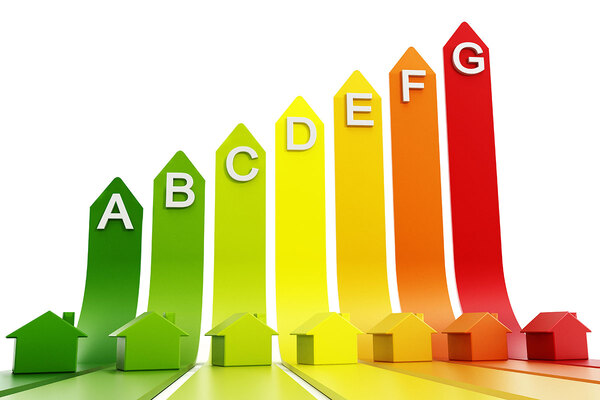DLUHC to consult on minimum energy efficiency standards for social housing by early next year
The government has confirmed that it will launch a consultation on minimum energy efficiency standards in the social housing sector in England by early next year.
Energy efficiency is a devolved matter, and current regulations set out that the minimum level of energy efficiency for private rented property in England and Wales is Energy Performance Certificate (EPC) E. The government’s target is for as many homes as possible to be upgraded to reach EPC C by 2035, and there is a 2030 target for ‘fuel-poor households’, commonly applied to social housing.
The government has previously vowed to launch a consultation on improving energy efficiency in social housing within six months of the Social Housing (Regulation) Bill becoming law.
The Department for Levelling Up, Housing and Communities (DLUHC) has now confirmed that it will launch this consultation on minimum energy efficiency standards in the sector by early next year.
The department has not revealed a launch date or how long the process will run for but has again committed to launching the consultation within six months of when the Social Housing (Regulation) Act gained Royal Assent, which was on 20 July.
The upcoming consultation will set out the rules of the timing of the implementation, Social Housing understands.
This comes after Kate Henderson, chief executive of the National Housing Federation (NHF), said in an open letter on 19 September that the NHF would welcome a consultation on minimum energy efficiency standards in the social housing sector.
And in January, a report from the Environmental Audit Committee urged the government to make the upgrading of homes to EPC C or above a “national priority”.
“We want to ensure that social housing tenants have safe, decent and warm homes,” said a DLUHC spokesperson.
“We remain committed to improving the quality of social housing and making it more energy efficient, and we will be consulting on implementing minimum energy efficiency standards for the social rented sector.”
Ms Henderson welcomed news of a consultation but said any legislative targets proposed will need to be aligned with housing associations’ current decarbonisation strategies and matched with “adequate levels of funding”.
“Housing associations are committed to creating high quality, well insulated homes, and many are already achieving Energy Performance Certificates A-C, with more working towards at least EPC C by 2030,” she said.
“A clear regulatory roadmap for energy efficiency standards would help further this work and we therefore welcome a consultation on minimum energy efficiency standards in the social housing sector.
“It is important to highlight, however, that any legislative targets proposed will need to be aligned with housing associations’ current decarbonisation strategies and matched with adequate levels of funding.
“With this in mind, we hope to see the full £3.8bn Social Housing Decarbonisation Fund released to ensure social housing providers have the resources they need to meet any new obligations.”
“As we head into the winter the ongoing energy crisis is a reminder of the need to focus on improving the energy efficiency of our homes as well as contributing to our long-term zero emissions goals,” said Rachael Williamson, head of policy and external affairs at the Chartered Institute of Housing (CIH).
“CIH is looking forward to having the opportunity to input to DLUHC’s consultation on minimum energy efficiency standards in the social rented sector, as required by the Social Housing (Regulation) Act.
“We know that social housing providers are committed to this agenda, but we need to ensure that there is a clear policy and funding framework to support this.”
In its report published on 26 September, Moody’s estimated the costs of retrofitting social housing units to EPC C by 2030-35 at between £12bn and £18bn.
In its Clean Growth Strategy in 2017, the government said it wanted all fuel-poor homes to be upgraded to EPC C by 2030 and its aspiration was for as many homes as possible to be EPC C by 2035 where “practical, cost-effective and affordable”.
It also said that it would develop a long-term trajectory to improve the energy performance standards of privately rented homes, with the aim of upgrading as many as possible to EPC C by 2030. In the Clean Growth Strategy paper, the government also said it would consult on how social housing can meet similar standards over this period.
In 2019, the government said that it would look at this long-term trajectory to upgrade homes to EPC C by 2030 and that it would also look at how social housing can meet similar standards over this period. The government reiterated its commitment to upgrade as many fuel-poor homes as practicable to a minimum EPC C by 2030.
In its Energy White Paper in 2020, the government reaffirmed its commitment that as many existing homes as possible must reach EPC C by 2035.
In the paper, the government committed to a review of the Decent Homes Standard to consider how it could better support the decarbonisation and energy performance of homes.
This was in particular with regard to the ambition set out in the Clean Growth Strategy that all homes should meet EPC C by 2035, where “practical, cost-effective and affordable”. The government said it would work closely with the housing sector to carry out this review.
Then in 2021, the government launched a consultation on improving the energy performance of privately rented homes in England and Wales. This outlined a phased trajectory for achieving the improvements for new tenancies from 2025 and all tenancies from 2028.
In an announcement on 20 September, prime minister Rishi Sunak said that, under revised plans, the government would scrap policies that force landlords to upgrade the energy efficiency of their properties. Instead, it would continue to encourage households to do so where they could.
However, it is understood that the changes do not apply to social housing.
The NHF criticised the government for scrapping energy efficiency targets and called for long-term funding and policy certainty as housing associations remain committed to their net zero work.
Ms Henderson said that a “clear regulatory roadmap” for energy efficiency standards would help further this work, and the NHF would welcome a consultation on minimum energy efficiency standards in the social housing sector.
The 2019 Conservative manifesto committed to a £3.8bn Social Housing Decarbonisation Fund (SHDF) over a 10-year period to 2030 to improve the energy performance of social rented homes in England.
Ms Henderson said the NHF had “strongly welcomed” the £778m awarded earlier this year as part of Wave 2.1 of the SHDF. She urged the government to recommit to its net zero manifesto pledge in the upcoming Autumn Statement and release the full £3.8bn from the SHDF to help the sector decarbonise its stock.
At the end of August, Social Housing reported that talks are ongoing between the Department for Energy Security and Net Zero and the UK Infrastructure Bank on potentially unlocking financing to support retrofitting in the sector.
Update: at 2.10pm and 5.38pm, 02.10.23
This article was updated to add a comment from the Chartered Institute of Housing and the National Housing Federation, and to specify in the opening paragraph that the 2030 target is applied to “fuel-poor households”.
Sign up for Social Housing’s weekly news bulletin
Social Housing’s weekly news bulletin delivers the latest news and insight across finance and funding, regulation and governance, policy and strategy, straight to your inbox. Meanwhile, news alerts bring you the biggest stories as they land.
Already have an account? Click here to manage your newsletters.
RELATED









